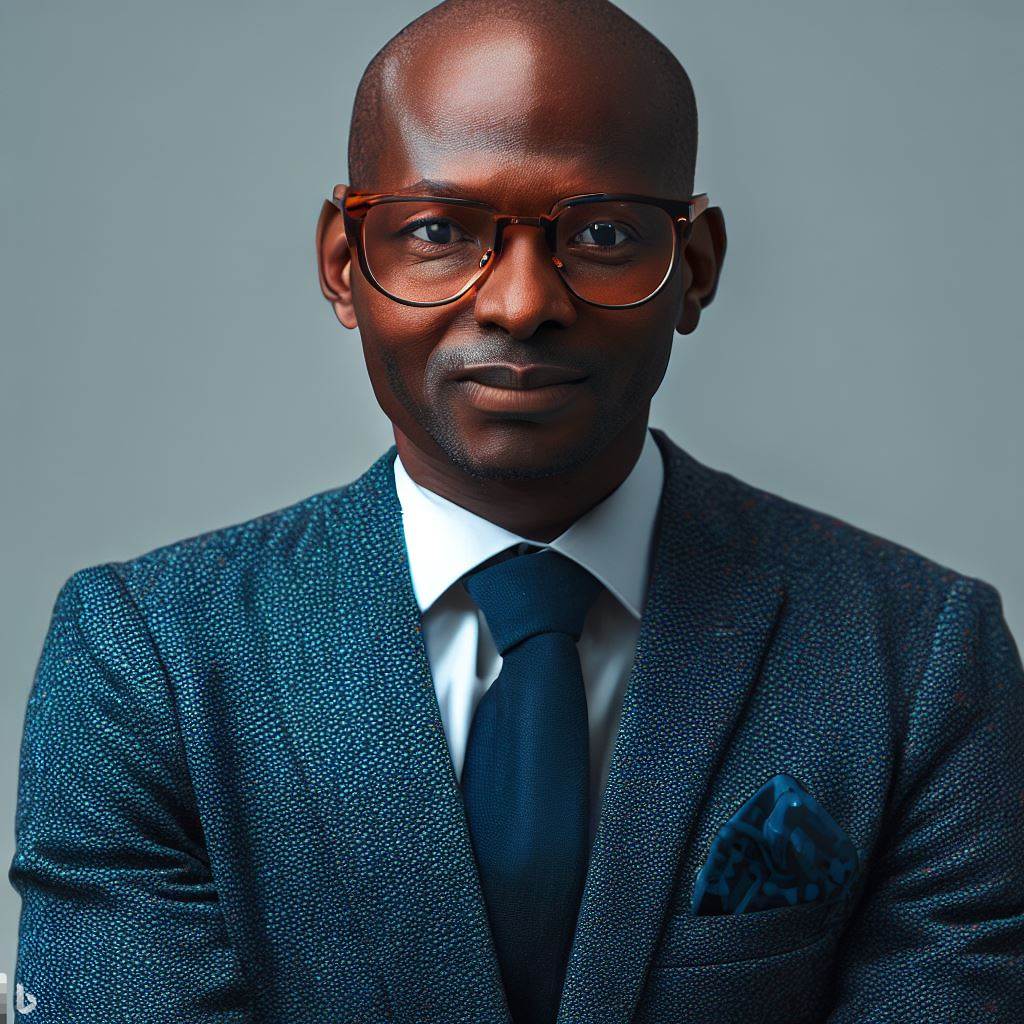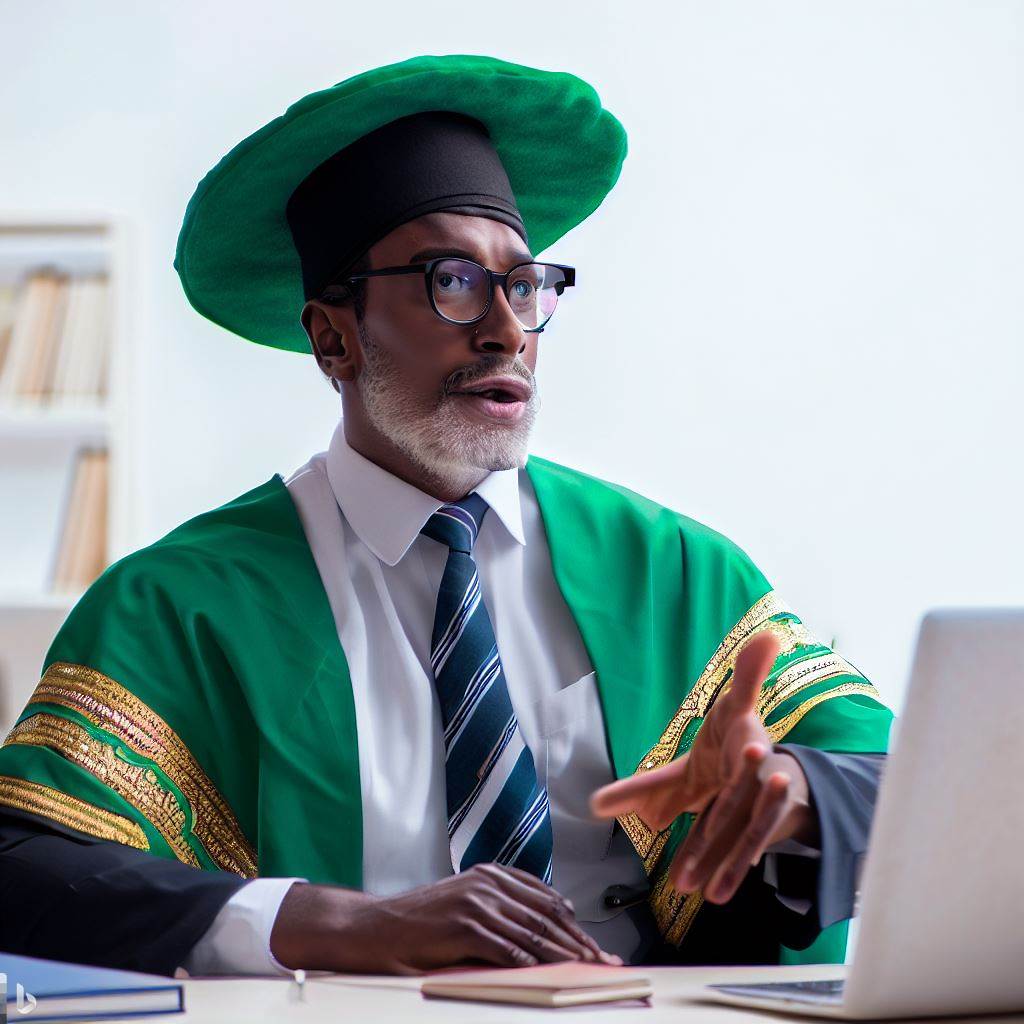Introduction
University professors in Nigeria play a crucial role in shaping the future of the nation.
They are highly educated individuals who are responsible for teaching, mentoring, and conducting research in higher education institutions.
In recent years, the importance of higher education in Nigeria has been steadily increasing.
This is due to the recognition that a well-educated population is essential for economic growth, social development, and global competitiveness.
Lack of Resources
One of the major challenges faced by university professors in Nigeria is the lack of resources.
Universities in the country often have limited funding allocation, which affects the quality of education provided by professors and their ability to conduct research.
The limited funding allocation has a direct impact on the professor’s ability to conduct in-depth research and contribute to their field of study.
This restriction inhibits their professional growth and hampers their ability to stay up-to-date with current advancements in their respective disciplines.
Furthermore, the lack of resources also affects the teaching-learning environment in universities.
Insufficient funds mean that classrooms and laboratories are not adequately equipped with modern technology, making it difficult for professors to effectively deliver their lessons and engage students.
Overall, the lack of resources poses a significant challenge for university professors in Nigeria, hindering their ability to provide quality education and conduct meaningful research.
Low Compensation and Benefits
One of the significant challenges faced by university professors in Nigeria is the relatively low salaries and benefits they receive.
This issue has a profound impact on their motivation and dedication to their profession, as well as the quality of education provided to students.
1. The relatively low salaries and benefits received by university professors
University professors in Nigeria are often faced with inadequate compensation compared to their counterparts in other countries.
The salaries offered are quite low, and the benefits package is often inadequate. This leads to a sense of dissatisfaction among the teaching faculty.
The low salaries and benefits may be attributed to several factors, including limited government funding for higher education and the overall economic situation in Nigeria.
As a result, university professors are unable to enjoy a comfortable lifestyle and are faced with financial constraints.
Moreover, the situation is exacerbated by the lack of transparency in salary structures and delays in payments.
Professors often face irregularities in salary disbursement, which further adds to their frustration and demotivation.
2. How low compensation affects their motivation and dedication to their profession
When university professors are faced with low compensation, their motivation and dedication to their profession take a significant hit.
It becomes challenging for them to maintain enthusiasm and passion for teaching while struggling to make ends meet.
The financial insecurity caused by low salaries leads to a demoralized workforce. Professors may feel undervalued and underappreciated, which negatively impacts their work ethic and productivity.
This, in turn, affects the overall learning experience of students. Additionally, the low compensation discourages talented individuals from pursuing a career in academia.
Many bright minds choose alternative career paths that offer better financial rewards, resulting in a shortage of qualified and experienced professors in Nigerian universities.
3. The resulting impact on the quality of education provided to students
The substandard compensation and benefits adversely affect the quality of education provided to students in Nigerian universities.
When professors are dissatisfied and demotivated, it reflects in their teaching methods and interactions with students.
Low compensation leads to a lack of investment in professional development and research activities.
Professors may not have the resources or motivation to stay updated with the latest advancements in their fields, leading to outdated course content and ineffective teaching strategies.
Furthermore, the exodus of talented professors seeking better opportunities abroad worsens the situation.
This brain drain deprives Nigerian universities of experienced and skilled educators, leaving a void in academic expertise and mentorship.
The compromised quality of education, in turn, hampers the overall development and competitiveness of Nigerian students.
They receive an education that does not meet international standards, limiting their career opportunities and future success.
In fact, the low compensation and benefits received by university professors in Nigeria are a significant challenge that affects their motivation and dedication to their profession.
This, in turn, compromises the quality of education provided to students.
Addressing this issue is crucial for improving the higher education system in the country and ensuring a bright future for both professors and students.
Read: Academic Publishing in Nigeria: A Guide for University Professors
Overburdened Workload
University professors in Nigeria face numerous challenges, and one of the most significant is the heavy workload they shoulder.
The responsibilities they bear are diverse, including teaching, research, and administrative tasks.
The heavy workload faced by university professors in Nigeria
Here are some key points that shed light on the daunting workload faced by university professors in Nigeria:
- Demanding Teaching Load: Nigerian professors are required to teach a large number of courses each semester, sometimes exceeding the recommended limit.
- Large Student Population: With the ever-increasing student enrollment rates, professors often find themselves with a significant number of students in their classes.
- Research Expectations: Conducting research and publishing scholarly articles is a fundamental requirement for university professors.
However, they often struggle to find adequate time for research amidst their teaching commitments. - Administrative Burden: Professors are not only responsible for teaching and research but also have administrative duties.
This includes attending meetings, supervising students, and participating in various departmental tasks. - Work-Life Balance Challenges: Balancing these multiple responsibilities becomes a constant challenge for university professors in Nigeria.
The workload is so demanding that it often affects their personal and family lives. - Long Hours: University professors dedicate long hours to their work, including teaching preparation, grading, and addressing students’ concerns outside of class time.
- Pressure for Publications: There is considerable pressure on professors to publish research papers in reputable journals. Meeting these expectations further adds to their workload.
- Mentorship and Advising: Professors are expected to provide guidance and mentorship to their students beyond classroom instruction. This entails additional time commitment and effort.
- Inadequate Support: Insufficient support from the university administration can exacerbate the workload challenges faced by professors.
Limited resources and lack of assistance can increase stress levels.
Challenges of balancing these responsibilities and maintaining work-life balance
These challenges demand a proactive approach to maintain a work-life balance:
- Efficient Time Management: Professors must prioritize tasks and allocate time wisely to meet all professional responsibilities.
- Delegation and Collaboration: Collaborating with colleagues and delegating some administrative tasks can help reduce the workload burden.
- Seeking Support: Professors should reach out to their department chairs or university administration for adequate support and resources.
- Setting Boundaries: Establishing clear boundaries between work and personal life can help professors maintain a healthier work-life balance.
- Wellness and Self-Care: Engaging in activities that promote physical and mental well-being is crucial for managing stress and preventing burnout.
In short, university professors in Nigeria encounter an overburdened workload due to the demanding teaching load, research expectations, administrative duties, and other associated responsibilities.
The challenges of balancing these tasks and maintaining a work-life balance require proactive measures and support from the university administration.
Read: Demystifying the Profession: A Day in the Life of a Nigerian Professor

Lack of Professional Development Opportunities
University professors in Nigeria face unique challenges, one of which is the lack of professional development opportunities.
These limitations hinder their ability to enhance their skills and knowledge, impacting the quality of education and research outcomes.
Limited opportunities for professors to enhance their skills and knowledge
In Nigeria, professors often face limited access to professional development opportunities.
This is mainly due to the inadequate funding for educational institutions, resulting in a lack of resources to organize workshops, seminars, and conferences for academic staff.
Furthermore, the geographical location of universities in Nigeria also poses a challenge.
Many institutions are situated in remote areas, making it difficult for professors to attend professional development programs held in urban centers.
The limited availability of such programs within their immediate vicinity further hinders their ability to enhance their skills.
Read: Insights into the Teaching Profession in Nigeria Today
The importance of continuous professional development in the academic field
Continuous professional development plays a crucial role in the academic field.
It enables professors to stay updated with the latest research findings, teaching methodologies, and technological advancements relevant to their disciplines.
As the world rapidly evolves, it is essential for professors to continuously develop their expertise to effectively impart knowledge to their students.
Through professional development programs, professors can improve their teaching techniques, develop new pedagogical strategies, and incorporate innovative technologies into their classrooms.
These opportunities also allow them to collaborate with other researchers and educators, fostering a culture of intellectual exchange and collaboration.
Consequences of the lack of professional development on education and research outcomes
The absence of adequate professional development opportunities negatively impacts the quality of education and research outcomes in Nigeria’s universities.
Without access to current knowledge and teaching methods, professors may rely on outdated materials and ineffective pedagogical practices.
This lack of exposure to new ideas and methodologies also affects the quality of research conducted by professors.
Without continuous professional development, they may struggle to produce cutting-edge research that contributes to the academic community.
Additionally, the absence of professional development opportunities can hinder career progression for professors.
In an increasingly competitive academic landscape, staying stagnant in terms of knowledge and skills can put them at a disadvantage when seeking promotions or grants.
Furthermore, the lack of professional development can also result in a stunted professional network.
Collaborations with experts in the field and exposure to diverse perspectives are crucial for academic growth and innovation.
Without access to such interactions, professors may find it challenging to broaden their horizons and contribute meaningfully to their disciplines.
In a nutshell, the limited professional development opportunities for university professors in Nigeria have significant implications for the quality of education and research outcomes.
It is crucial that measures are taken to provide adequate support, resources, and access to continuous professional development programs for professors.
By investing in their growth, we can ensure that Nigerian universities maintain a high standard of education and research, contributing to the progress and development of the nation.
Read: The Salary Scale: How Much do Professors Earn in Nigeria?
Uncover the Details: Inspiring Innovation: Nigeria’s Top University Professors
Political and Social Pressures
University professors in Nigeria face unique challenges due to political and social factors that influence their work.
These pressures often hinder their ability to exercise academic freedom and maintain impartiality, affecting their research and teaching methods.
Influence of Political and Social Factors
- Political instability in Nigeria creates an environment where university professors are vulnerable to external pressures.
- The government’s influence on higher education institutions can limit the freedom of expression of professors.
- Social expectations and cultural norms sometimes clash with the academic principles of university professors.
- Political and social factors can shape the direction of research and teaching, impacting the quality of education.
- The fear of repercussions from political and social groups can lead to self-censorship among professors.
Challenges in Exercising Academic Freedom
- University professors often struggle to express controversial ideas or critique the government without facing consequences.
- The fear of losing their job or being threatened with legal action restricts the academic freedom of professors.
- Some professors find it difficult to challenge prevailing ideologies or engage in critical discourse without facing backlash.
- Political and social pressures can lead to a culture of conformity instead of academic independence.
- Exercising academic freedom becomes particularly challenging in sensitive research areas such as politics, religion, or social issues.
Impartiality and External Pressures
- University professors face the challenge of maintaining impartiality when their personal beliefs are influenced by external pressures.
- Social expectations and political affiliations can impact professors’ objectivity in delivering education.
- External pressures may steer professors towards teaching biased perspectives instead of promoting a balanced view.
- Professors who dare to challenge prevailing narratives risk being labeled as politically biased or unpatriotic.
- Efforts to maintain impartiality become more difficult when external pressures infiltrate research funding and publication processes.
Examples of Impact on Research and Teaching Methods
- Research topics that are critical of the government or societal norms may face funding challenges or limited support.
- Professors may have to avoid certain discussions in class to prevent offending political or social groups.
- Textbooks and curriculum choices can be influenced by political or social pressure, limiting academic diversity.
- Professors may receive directives or guidelines from higher authorities that restrict the scope of their research.
- External pressures can lead to self-censorship, resulting in a lack of innovation and critical thinking in teaching methods.
In general, political and social pressures in Nigeria significantly impact university professors’ ability to exercise academic freedom and maintain impartiality.
These pressures create unique challenges that hinder research and limit the diversity of teaching methods.
Recognizing and addressing these challenges is essential for the promotion of a robust and independent academic environment in Nigerian universities.
Read: Nigeria’s Professorship Journey: From PhD to Full Professor
Conclusion
University professors in Nigeria face unique challenges that hinder their effectiveness and the quality of education.
These challenges include inadequate funding, poor infrastructure, high student-to-faculty ratios, and limited professional development opportunities.
Addressing these challenges is crucial for the betterment of the education system in Nigeria.
By providing adequate funding and resources, the government, institutions, and stakeholders can support professors in delivering quality education.
It is essential to emphasize that professors play a crucial role in shaping the future of the nation by educating the next generation of leaders and professionals.
Therefore, their welfare and development should be a priority. To achieve this, a call to action is necessary.
Government bodies should increase funding for universities, allocate resources for infrastructure development, and provide opportunities for professors to enhance their teaching and research abilities.
Institutions must create a conducive environment that promotes teaching excellence and supports professors’ personal and professional growth.
Stakeholders such as industry leaders and alumni should collaborate with universities to establish partnerships that provide financial support, research opportunities, and mentorship for professors.
Addressing the unique challenges faced by university professors in Nigeria will ultimately lead to an improved education system, producing competent graduates who can contribute to the development of the country.
It is time for all relevant stakeholders to work together and invest in the success and well-being of Nigeria’s esteemed professors.




